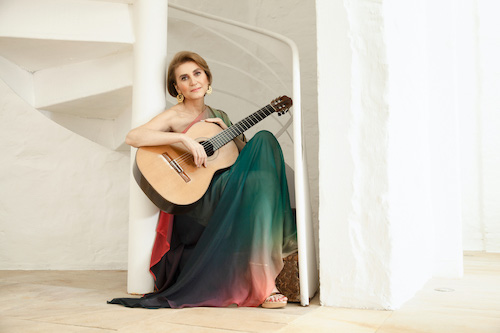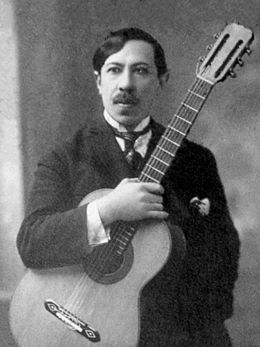by Jarrett Hoffman

Rojas will make her Cleveland debut on Saturday, March 14 at 7:30 pm at Plymouth Church in a concert presented by the Cleveland Classical Guitar Society. Her program highlights Barrios, a fellow Paraguayan who lived from 1885 to 1944.
The first half travels from Spain (Federico Moreno Torroba’s Sonatina) to Brazil (Heitor Villa-Lobos’ Prelude No. 4 and Étude No. 4) and England (Lennox Berkeley’s Sonatina, Op. 52, No. 1). And the second half is all Barrios, including two of his Op. 8 Waltzes, the Estudio de Concierto, Las Abejas, Un Sueño en la Floresta, La Catedral, and an arrangement of his Danza Paraguaya in which Rojas will be joined by students of the Guitar Society.
Rojas’ first encounter with the works of that composer came when she was a young guitarist. “I heard the music of Barrios and I fell in love with it,” she said during a recent telephone conversation.
A few years later, Rojas heard guitarist John Williams’ first recording of Barrios’ music. “It was an LP that one of my friends had bought in Europe and brought to Paraguay. And it was something precious just to have an LP of classical guitar, because those were things we didn’t have in Paraguay in those days — or at least they weren’t available to me. So the combination of listening to that beautiful music, played so beautifully by the great Williams, and having an LP in front of me was really incredible.”
Speaking of John Williams, I asked Rojas about her 2018 recital with him at the Sam Wanamaker Playhouse, next to the Globe Theater. “He’s an amazing musician, as we all know, and also a wonderful human being,” Rojas said. “He was very generous to invite me to London, and I had the privilege and honor to perform the music of Barrios — and also to play other rep with him, which was very special.”

In a review of that Globe recital, Mark Small of Classical Guitar Magazine noted something that Rojas told the audience: Barrios once performed in London as his alter ego Nitsuga Mangoré, dressed in native costume. (The composer was partly of Guaraní origin, and Nitsuga is Agustin spelled backwards.) “He did that over a period of his life, and it was a marketing strategy, I assume, to try to bring the attention of audiences to his concerts,” Rojas said.
Barrios famously did not teach until the last years of his life. “I don’t think it’s that he was selective,” Rojas said. “I think it was the only opportunity he had, when he was offered a teaching position at the conservatory in El Salvador, which was also the only stable job that he had during his lifetime.”
His students became known as the Twelve Mangoreans. “They embraced his music with so much passion and carried the torch in a way,” Rojas said, adding that it was a student of one of those twelve who eventually brought the music of Barrios to John Williams in London — eventually leading to that Williams LP coming into the hands of Rojas.
On the faculty of the Berklee College of Music, Berta Rojas is not only a three-time Latin Grammy nominee, but also the recipient of numerous honors from her home country in recognition of her contributions to Paraguayan culture.
“I feel very privileged to have received those awards,” Rojas said. “But you know what’s most important for me? The fact that I have played all throughout my country, and that I have played for young people in so many schools in Paraguay.” During her tour of schools from 2009-2018, Rojas said she performed for 50,000 kids.
“For me, that is the most important award: to have had the opportunity to witness firsthand the reality of Paraguayan society, to be able to speak with the kids, and to be able to listen to them. We had a question-and-answer session at the end of every meeting.”
One question Rojas remembers: if she had the opportunity to meet Agustín Barrios, what would she ask him?
“There’s one note in Julia Florida that’s always bothered me,” she said, laughing. “It’s in the original manuscript, and it sounds horrible if you play it as it is. And so my question for Agustín Barrios would be, what were you thinking?”
The last words of our conversation were about the Cleveland Classical Guitar Society. “I feel so honored to be a part of this series,” Rojas said. “I have seen the interview on CBS about the guitar program, and it’s just amazing.” She looks forward to joining with students to close the program with Barrios’ Paraguayan Dance, thanks to an arrangement of the piece by the Guitar Society. “I’m truly thankful,” she said.
Published on ClevelandClassical.com March 10, 2020.
Click here for a printable copy of this article



